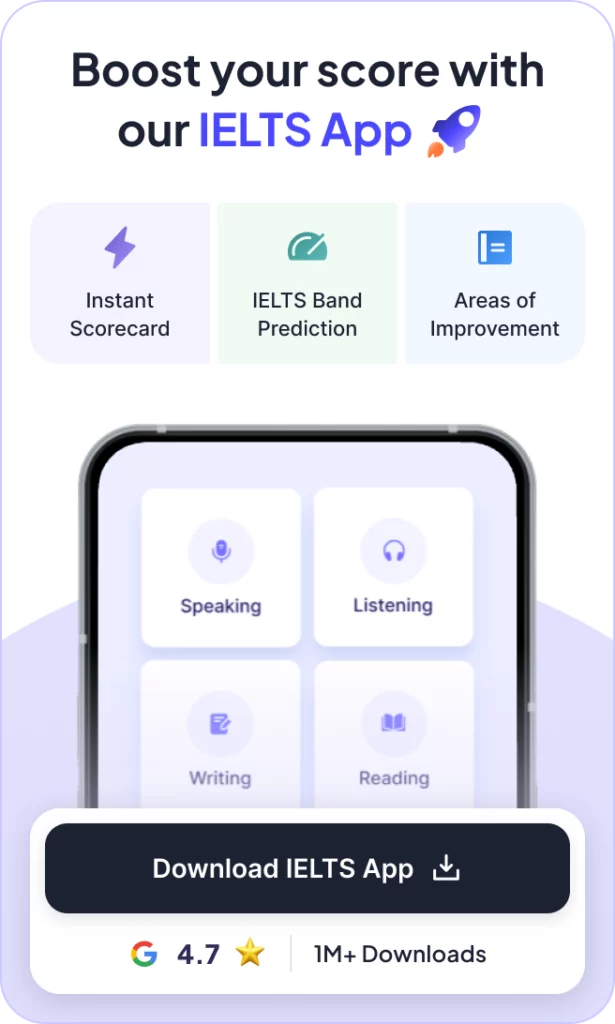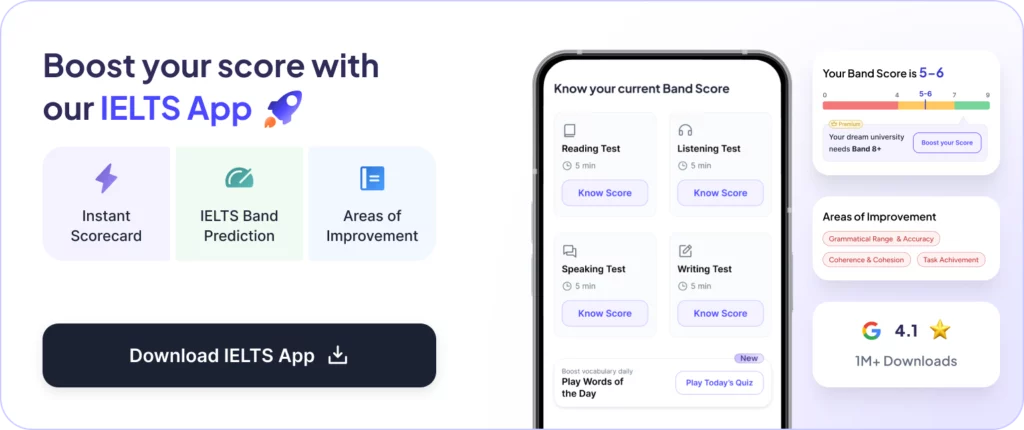‘Describe a popular/well-known person in your country’ is a common cue card topic in the IELTS Speaking test. You can talk about someone famous who inspires you or is widely recognised in your country.
During this test, the examiner assesses your speaking skills, focusing on how accurately and fluently you convey your ideas, your choice of vocabulary, and your grammar usage.
This section is a part of IELTS Test which is trusted by 12,000 organisations globally. The test is divided into four parts-
In this, the speaking module of the IELTS exam consists of three parts:
- Part 1: Introduction Round, in which you answer simple questions about familiar topics.
- Part 2: Individual Long Turn (Cue Card Round) where you speak for 2-3 minutes on a given topic, like ‘Describe a popular/well-known person in your country.’
- Part 3: Two-way Discussion Round, in which you engage in a deeper discussion with the examiner about the cue card topic.
In Part 2 of the IELTS Speaking module, also known as the Individual Long Turn, the examiner provides you with a cue card topic like ‘Describe a popular/well-known person in your country.’ You have one minute to prepare your thoughts before speaking for 2-3 minutes.
| Duration of the Part 2 | 3-4 minutes |
| Speaking Time | 2-3 minutes |
| Preparation Time | 1 minute |
This blog will explore the IELTS cue card topic, ‘Describe a popular/well-known person in your country.’ We’ll explore how to answer this cue card section effectively, providing sample answers that are both impressive and impactful.
How to Answer the Cue Card: Describe A Popular/Well Known Person In Your Country
Understanding how to effectively answer cue card topics in the IELTS Speaking test is crucial for achieving a high score. This skill allows you to demonstrate your ability to speak fluently, coherently, and confidently, which are key criteria assessed in this section.
When the cue card section begins, the examiner will give you a cue card with a topic printed on it. They will then instruct you to speak on that topic for up to 2 minutes.
Here is how the cue card for the topic will look like:
| Cue Card Topic: Describe A Popular/Well Known Person In Your Country You Should Say: Who is this person? What has this person done? Why is this person well-known? Explain why you admire this person. |
The best approach to answering these cue cards is to break your response into structured parts: Introduction, describing your experience/opinion/interest, key highlights, and conclusion.
Here’s what each section of your response should focus on:
Introduction (Covers: Who is this person?):
- Briefly introduce the person you have chosen.
- Mention why this person is well-known or popular in your country.
- State your personal connection or interest in this person.
Describe your experience/opinion/interest (Covers: What has this person done?)
- Talk about how you first learned about this person.
- Share any personal encounters or stories related to them.
- Discuss why this person is important to you or to your country.
Key highlights (Covers: Why is this person well-known?):
- Highlight significant achievements or contributions of this person.
- Mention any challenges they might have overcome or controversies surrounding them.
- Provide interesting facts or anecdotes that make this person memorable.
Conclusion (Covers: Explain why you admire this person):
- Summarise why this person is popular or well-known.
- Reflect briefly on their impact on your country or society.
- End with a memorable statement or a personal reflection related to this person.
Following this structured approach ensures that your response is comprehensive, well-organized, and delivered within 2 minutes. This method showcases your speaking ability and enhances your coherence and cohesion in English.
Also Read: Best IELTS Cue Cards for 7+ Band Score
Describe A Popular/Well Known Person In Your Country: Sample Answer 1
Understanding how to structure and deliver sample answers for the cue card topic ‘Describe A Popular/Well Known Person In Your Country’ is essential for your IELTS Speaking test preparation. Sample answers illustrate the correct format and help you practice expressing ideas fluently and coherently within the given time frame.
Introduction (Covers: Who is this person?):
- The person I would like to talk about is Nelson Mandela, a towering figure in South African history and a global icon of resistance against apartheid.
- Mandela, born in 1918, dedicated his life to fighting racial segregation and injustice in South Africa.
- His name became synonymous with the struggle for equality and human rights, earning him international acclaim as a symbol of peace and reconciliation.
Describe your experience/opinion/interest (Covers: What has this person done?):
- My fascination with Mandela began when I first learned about his lifelong commitment to justice and equality during my school years.
- Mandela’s pivotal role in leading the anti-apartheid movement and enduring 27 years of imprisonment on Robben Island deeply impressed me.
- His resilience and unwavering belief in peaceful resistance have left an indelible mark on global politics and civil rights movements.
Key highlights (Covers: Why is this person well-known?):
- Mandela’s most notable achievement was his presidency of South Africa, becoming the country’s first black president in 1994.
- He played a crucial role in dismantling apartheid policies and advocating for reconciliation among South Africans.
- Mandela’s charisma, moral authority, and advocacy for human rights earned him admiration worldwide, making him one of the most revered leaders of the 20th century.
Conclusion (Covers: Explain why you admire this person):
- I admire Mandela not only for his remarkable leadership but also for his unwavering commitment to forgiveness and unity.
- His ability to bridge divides and inspire hope in the face of adversity continues to resonate with me.
- Mandela’s legacy serves as a constant reminder of the power of perseverance and compassion in shaping a better world for all.
Describe A Popular/Well Known Person In Your Country: Sample Answer 2
Introduction (Covers: Who is this person?):
- I would like to talk about Sir David Attenborough, a renowned British broadcaster and natural historian celebrated for his contributions to wildlife documentaries.
- Born in 1926, Attenborough has dedicated his career to educating audiences worldwide about the wonders of the natural world.
- His distinctive voice and passionate storytelling have made him a beloved figure, synonymous with insightful and compelling nature documentaries.
Describe your experience/opinion/interest (Covers: What has this person done?):
- My admiration for Sir David Attenborough grew from watching his documentaries, where he explores diverse ecosystems and highlights the urgency of conservation.
- Attenborough’s groundbreaking series, such as “Planet Earth” and “Blue Planet,” showcases his deep knowledge of wildlife and environmental issues.
- His advocacy for biodiversity preservation and climate action has spurred global awareness and prompted meaningful change in environmental policies.
Key highlights (Covers: Why is this person well-known?):
- Attenborough’s career spans over six decades, during which he has narrated and presented numerous award-winning documentaries.
- His ability to captivate audiences of all ages with his storytelling and cinematography sets him apart as a visionary in wildlife filmmaking.
- Attenborough’s influence extends beyond television, shaping public perception and policy discussions on ecological conservation worldwide.
Conclusion (Covers: Explain why you admire this person):
- I deeply admire Sir David Attenborough for his dedication to raising awareness about environmental issues and inspiring action through his documentaries.
- His commitment to sharing the beauty and fragility of our planet serves as a powerful reminder of our responsibility to protect and preserve natural habitats.
- Attenborough’s legacy as a biodiversity and sustainability champion inspires individuals and governments to prioritise conservation efforts for future generations.

Excel in IELTS with India’s Top Online Coaching
Leap has helped more than 1 Lakh students achieve 7+ IELTS band.
Describe A Popular/Well Known Person In Your Country: Sample Answer 3
Introduction (Covers: Who is this person?):
- I would like to talk about Sir David Attenborough, a renowned British broadcaster and natural historian celebrated for his contributions to wildlife documentaries.
- Born in 1926, Attenborough has dedicated his career to educating audiences worldwide about the wonders of the natural world.
- His distinctive voice and passionate storytelling have made him a beloved figure, synonymous with insightful and compelling nature documentaries.
Describe your experience/opinion/interest (Covers: What has this person done?):
- My admiration for Sir David Attenborough grew from watching his documentaries, where he explores diverse ecosystems and highlights the urgency of conservation.
- Attenborough’s groundbreaking series, such as “Planet Earth” and “Blue Planet,” showcases his deep knowledge of wildlife and environmental issues.
- His advocacy for biodiversity preservation and climate action has spurred global awareness and prompted meaningful change in environmental policies.
Key highlights (Covers: Why is this person well-known?):
- Attenborough’s career spans over six decades, during which he has narrated and presented numerous award-winning documentaries.
- His ability to captivate audiences of all ages with his storytelling and cinematography sets him apart as a visionary in wildlife filmmaking.
- Attenborough’s influence extends beyond television, shaping public perception and policy discussions on ecological conservation worldwide.
Conclusion (Covers: Explain why you admire this person):
- I deeply admire Sir David Attenborough for his dedication to raising awareness about environmental issues and inspiring action through his documentaries.
- His commitment to sharing the beauty and fragility of our planet serves as a powerful reminder of our responsibility to protect and preserve natural habitats.
- Attenborough’s legacy as a biodiversity and sustainability champion inspires individuals and governments to prioritise conservation efforts for future generations.
Also Read: Top IELTS Tips and Tricks For Best IELTS Scores 2024
IELTS Speaking Part 3: Discussion
The IELTS Speaking test includes a Follow-Up Round, or Part 3. In this part, the examiner asks more questions about the topic given in the cue card. For this cue card topic, ‘Describe a popular/well-known person in your country,’ you might be asked to talk about why this person is famous, how they influenced people or compare them to other famous people.
This round lasts about 4-5 minutes and is your chance to show you can keep a conversation going, use different words and grammar, and explain your ideas clearly. Doing well in this part can really boost your overall speaking score and show your strong English skills.
Q1. In what ways do celebrities or famous people give back to the community?
Answer 1: Celebrities often use their influence to raise awareness about social issues through charity work and public campaigns. For example, they may fundraise for humanitarian causes or volunteer their time for community projects. This not only mobilises support but also encourages fans to contribute to meaningful causes.
Answer 2: Famous individuals establish foundations or nonprofits dedicated to various social causes, such as education, healthcare, or environmental conservation. Their philanthropic efforts make a significant impact by addressing societal challenges and improving the lives of disadvantaged communities.
Q2. What are some negative effects of being a popular person?
Answer 1: The pressure of public scrutiny can lead to stress and mental health issues among celebrities. Constant media attention may invade their privacy and limit personal freedom, affecting their quality of life.
Answer 2: Popular figures may face unrealistic expectations from the public, leading to a loss of authenticity in their public image. Additionally, controversies or scandals can tarnish their reputation and impact their career prospects negatively.
Q3. What is your opinion on children imitating their idols?
Answer 1: Children often look up to celebrities as role models, emulating their behaviour and aspirations. This can inspire positive traits like determination and creativity, shaping their ambitions positively.
Answer 2: However, blindly imitating celebrities without critical thinking can lead to unrealistic expectations and inappropriate behaviours. It’s crucial for children to have guidance to differentiate between admirable qualities and negative influences from their idols.
Q4. How do people become famous?
Answer 1: Fame can be achieved through various means, such as talent, hard work, and strategic promotion. Successful individuals often excel in entertainment, sports, or business, gaining recognition through their achievements and public visibility.
Answer 2: In today’s digital age, social media platforms provide a platform for ordinary people to gain fame quickly through viral content or influential online presence. The media and public interest also play crucial roles in elevating individuals to celebrity status.
To Sum Up
Practising is the most essential part of the IELTS Speaking test, and it will help you to brush up your speaking skills. It will help you to keep your views in a more crystal clear manner. However, one should give equal attention to all the modules of the IELTS as well.
Our free masterclass is designed to help you crack the IELTS exam and achieve a good band score.
Here are some similar Cue Card topics to practice:
- IELTS CUE CARD: Describe a person who you believe dresses well
- IELTS CUE CARD: Describe an invention changed the peoples life
- IELTS CUE CARD: Describe a cafe you like to visit
- IELTS CUE CARD: Describe a Time When You Observed the Stars
- IELTS CUE CARD: Describe a long car journey you went on
Frequently Asked Questions
-
Q. What is the duration of IELTS speaking part 2?
A. In IELTS Speaking Part 2, you’ll have 3-4 minutes to tackle the cue card topic. You get 1 minute to prep, and then it’s showtime. Talk away for 1-2 minutes straight on the given topic. It’s your chance to showcase your speaking skills and provide detailed, relevant information. Just remember to keep focused and make the most of your time!
-
Q. How to answer the cue card topic “Describe A Popular/Well Known Person In Your Country”?
A. When you’re asked to talk about someone famous in your country, think about someone everyone knows. Start by introducing who they are and why they’re well-known—maybe they’re a musician, a politician, or even a social media star. Share what makes them stand out, like their achievements or how they’ve influenced people. Throw in a story or two to bring them to life. And don’t forget to add your thoughts on why they’re such a big deal.
-
Q. What are the other commonly asked cue card topics?
A. Common cue card topics in the IELTS Speaking test include describing a memorable holiday, discussing a favourite book or film, describing a childhood memory, talking about a family member or friend, describing a place you’d like to visit, discussing a festival or celebration, and describing a hobby or interest. These topics often require personal experiences, vivid descriptions, and your opinions, making them great opportunities to showcase your language skills and fluency.
-
Q. What is the total time of the speaking test?
A. The total duration of the speaking test in IELTS is 11 to 14 mins. The speaking test is divided into three parts.
Part 1: the introduction round (4-5 minutes)
Part 2: the cue card section (3-4 minutes)
Part 3: the discussion round (4-5 minutes).This structured format allows you to demonstrate your speaking abilities across various contexts and topics.
-
Q. Are the speaking test part 2 for Academic and General the same?
A. Yes, there is no difference between the academic and general speaking test. The duration of the speaking test is of 11-14 mins in total. The speaking test is usually based on one-to-one interview with the examiner. And the part 2 is for 3-4 minutes.
– The speaking test is done in 3 rounds:
– The introduction round
– The cue card section
– The discussion round.The aim is to assess the ability to speak fluently, coherently, and accurately, regardless of whether the candidate is taking the Academic or General Training module.
-
Q. How to frame your answer in 1 minute?
A. During IELTS speaking test you are given 1 minute of preparation time and 2-3 minutes of speaking time. You can frame your answer during the preparation time of 1 minute. You should divide your topic in sub parts and try to frame your answer accordingly. You can answer the question by answering the subtopics of the cue card topic.
-
Q. Can I par the time limit during the speaking test?
A. You cannot exceed the time limit during the speaking test. The total time for speaking test is 11-14 mins and If your answer is too long the examiner can stop you from answering and move on to the next question. It is the natural process of the exam and your marks won’t be deducted.
-
Q. What is the fees of the IELTS test in India?
A. A. The fee for the IELTS test in India is approximately 17,000 INR for the computer as well as the paper-based test. You can register for the test through authorised test centers, where they will choose a convenient test date. It’s advisable to book in advance as slots fill up quickly, especially during peak testing periods.
-
Q. Can I ignore the examiner’s opinion?
A. Yes, you can disagree with the examiner’s opinion. You should know that your views are not considered in the evaluation. The examiner evaluates on the factors such as:
– Pronunciation
– Fluency
– Proficiency of language
– Accuracy of grammar. -
Q. What is the marking scheme for the IELTS speaking test?
A. The IELTS Speaking test is assessed across four criteria: fluency and coherence, lexical resource (vocabulary usage), grammatical range and accuracy, and pronunciation. Each criterion is scored on a band scale from 0 to 9. Examiners evaluate your ability to speak fluently with a varied vocabulary, accurate grammar, clear pronunciation, and coherent responses, ensuring a comprehensive assessment of your speaking skills.


















Have Questions? Get Guidance to reach your Dream University
Connect with India's finest counsellors and biggest study abroad community.
Get Guidance